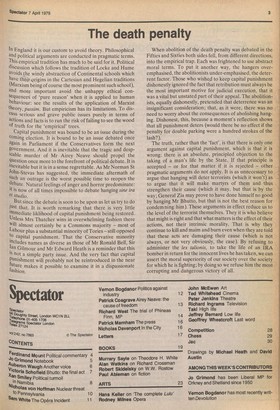The death penalty
In England it is our custom to avoid theory. Philosophical and political arguments are conducted in pragmatic terms. This empirical tradition has much to be said for it. Political discussion which follows the tradition of Locke and Hume avoids the windy abstraction of Continental schools which have tlr_9rigins in the Cartesian and Hegelian traditions (Marxism being of course the most prominent such school), and more important avoid the unhappy ethical consequences of 'pure reason' when it is applied to human behaviour: see the results of the application of Marxist theory, passim. But empiricism has its limitations. To discuss serious and grave public issues purely in terms of actions and facts is to run the risk of failing to see the wood of truth for the 'empirical' trees. Capital punishment was bound to be an issue during the Coming election. It is bound to be an issue debated once again in Parliament if the Conservatives form the next government. And it is inevitable that the tragic and despicable murder of Mr Airey Neave should propel the question once more to the forefront of political debate. It is inevitable but it is in a sense regrettable. As Mr Norman St John-Stevas has suggested, the immediate aftermath of such an outrage is the worst possible time to reopen the debate. Natural feelings of anger and horror predominate: it is now of all times impossible to debate hanging sine ira et studio.
But since the debate is soon to be upon us let us try to do Just that. It is worth remarking that there is very little immediate liklihood of capital punishment being restored. Unless Mrs Thatcher wins in overwhelming fashion there Will almost certainly be a Commons majority — most of Labour plus a substantial minority of Tories — still opposed to capital punishment. That the Conservative minority includes names as diverse as those of Mr Ronald Bell, Sir Ian Gilmour and Mr Edward Heath is a reminder that this is not a simple party issue. And the very fact that capital Punishment will probably not be reintroduced in the near future makes it possible to examine it in a dispassionate fashion.
When abolition of the death penalty was debated in the Fifties and Sixties both sides fell, from different directions, into the empirical trap. Eadh was frightened to use abstract moral terms. To put it another way, the hangers overemphasised, the abolitionists under-emphasised, the deterrent factor. Those who wished to keep capital punishment dishonestly ignored the fact that retribution must always be the most important motive for judicial execution, that it was a vital but unstated part of their appeal. The abolitionists, equally dishonestly, pretended that deterrence was an insignificant consideration; that, as it were, there was no need to worry about the consequences of abolishing hanging. Dishonest, this, because a moment's reflection shows that all punishment deters (would there be no effect if the penalty for double parking were a hundred strokes of the lash?).
The truth, rather than the 'fact', is that there is only one argument against capital punishment, which is that it is wrong: there is an absolute, principled objection to the taking of a man's life by the State. If that principle is accepted — or for that matter if it is rejected — other pragmatic arguments do not apply. It is as unnecessary to argue that hanging will deter terrorists (which it won't) as to argue that it will make martyrs of them and thus strengthen their cause (which it may, but that is by the way; General Zia may prove to have done himself no good by hanging Mr Bhutto, but that is not the best reason for condem ning him). These arguments in effect reduce us to the level of the terrorist themselves. They it is who believe that might is right and that what matters is the effect of their actions, not their intrinsic morality. That is why they continue to kill and maim and burn even when they are told that these acts are damaging their cause (which is not always, or not very obviously, the case). By refusing to administer the lex talionis, to take the life of an IRA bomber in return for the innocent lives he has taken, we can assert the moral superiority of our society over the society for which he is fighting; by doing so we refuse him the most corrupting and dangerous victory of all.


































 Previous page
Previous page